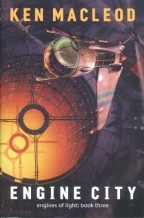
Engine City
Ken MacLeod
271 pages
published in 2002
This is the third and last book in the Engines of Light series, the previous two being Cosmonaut Keep and Dark Light. As the capstone of the series, Engine City was a disappointment.
From the start this series was supposed to be a traditional science fiction trilogy, unlike MacLeod's previous Fall Revolution series in which the individual novels were only thematically related. This worked well in the first two books, with Cosmonaut Keep setting up the plot and Dark Light continuing the plotlines while setting up some new ones of its own, all of which should then be resolved in Engine City, which they were, but in a far too abrupt manner. On the whole it seemed as if MacLeod had grown bored with the series and crammed everything that needed to be resolved in one slim book, instead of taking it at the same pace as the first two.
The background to the series is that over the course of human (and even homonid) history, powerful aliens have been kidnapping isolated groups of people from Earth, depositing them in a cluster of star systems called the Second Sphere. These aliens themselves are intelligent Saurians also kidnapped from Earth some hundred million years ago or so and are allied to vast spacefaring kraken, who pilot starships the Saurians used. Both races are in service of the mysterious space gods, which are vast extremophile nanobacterians living in asteroids and comets surrounding most starsystems. Into this mix came, as told in Cosmonaut Keep, the first group of humans to arrive voluntarily in the Second Sphere several hundred years ago, but since the people on this expedition were effectively immortal, some of them are still around. Two of them, Matt Cairns, more or less the hero of the series, and his old pal Volkov, are hoping to spread a revolution against the gods in the Second Sphere, though their individual methods are in conflict with each other. And then there are the real aliens which have unexpectedly shown up, the octopods; what is their role in all of this going to be?
Now this sounds like it should be exciting and interesting, and Macleod indeed succeded in holding my attention to the end of the book, but on the whole the ending was unsatisfying. I think this is because MacLeod tried to do something new and almost succeeded; you can tell that this could've been a great book and a great series, rather than just a good book and a good series.
What MacLeod tried to do was to write a Fortean space opera.Charles Fort was an American investigator of strange phenomena, who looked into things like rains of frogs or fish, without either being a dedicated sceptic or a wide-eyed believer, but simple a recorder and cataloguer of such things. One of his central ideas was the idea that we are owned by someone, that Earth is a possession of an alien being or race and humanity is no more than some sort of cattle, which has been used by quite a few science fiction writers ever since. What MacLeod tried to do is to write a space opera around this idea, throwing in everything but the kitchen sink: flying saucers, Greys, space squid, men in black, alien gods directing the evolution of humanity, the Gaia theory, alien abductions etc. and creating a coherent story and worldview out of it. He nearly succeded in both.
Read more about:
Ken Macleod,
Engine City,
science fiction,
book review